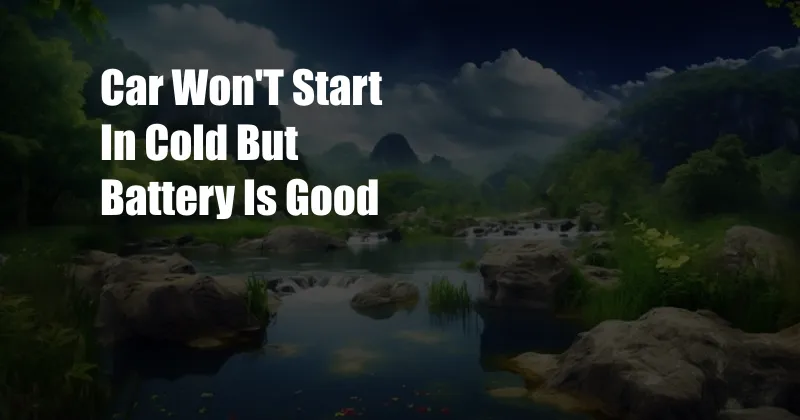
<h2>Why Won’t My Car Start in Cold Weather, Even with a Good Battery?</h2>
<p>As the winter weather approaches, many drivers may find themselves facing a frustrating problem: their car won't start, even though the battery is good. This can be a particularly distressing situation, especially if you're in a hurry or stranded in a remote location. In this blog post, we'll delve into the reasons why your car might not start in cold weather, despite having a healthy battery, and provide some tips and expert advice on how to resolve this issue.</p>
<p>Before we dive into the technical details, it's important to understand the role of the battery in starting a car. The battery provides the electrical power needed to engage the starter motor, which in turn cranks the engine. In cold weather, the battery's ability to deliver power is reduced, making it more difficult to start the car.</p>
<h3>Common Reasons for Difficulty Starting in Cold Weather</h3>
<p>Several factors can contribute to starting problems in cold weather, including:</p>
<ul>
<li><strong>Thickened engine oil:</strong> In cold temperatures, engine oil can become thicker and more viscous, making it harder for the starter motor to turn the engine.</li>
<li><strong>Weak spark plugs:</strong> Spark plugs provide the spark that ignites the fuel in the cylinders. In cold weather, weak or faulty spark plugs may not generate a strong enough spark to ignite the fuel.</li>
<li><strong>Frozen fuel lines:</strong> If there is any moisture in the fuel lines, it can freeze in cold weather and block the flow of fuel to the engine.</li>
<li><strong>Faulty fuel pump:</strong> The fuel pump is responsible for supplying fuel to the engine. A weak or failing fuel pump may not be able to provide sufficient fuel, especially in cold weather.</li>
<li><strong>Electrical problems:</strong> Cold weather can also affect electrical connections, making it harder for the starter motor to engage or for the ignition system to function properly.</li>
</ul>
<h3>Expert Tips and Advice</h3>
<p>To prevent or resolve starting problems in cold weather, consider the following tips and expert advice:</p>
<ul>
<li><strong>Use the right oil:</strong> Check your owner's manual for the recommended oil viscosity for your vehicle. Using a lower-viscosity oil in cold weather can make it easier for the engine to turn over.</li>
<li><strong>Replace old spark plugs:</strong> Inspect your spark plugs regularly and replace them if they show signs of wear or damage. New spark plugs can provide a stronger spark, even in cold weather.</li>
<li><strong>Check for frozen fuel lines:</strong> If you suspect frozen fuel lines, park your car in a warm place and allow the lines to thaw. Never attempt to thaw frozen fuel lines with an open flame or heat gun.</li>
<li><strong>Test your fuel pump:</strong> If you have a fuel pressure gauge, connect it to the fuel line to check the fuel pressure. If the pressure is low or non-existent, the fuel pump may need to be replaced.</li>
<li><strong>Clean electrical connections:</strong> Remove any corrosion or dirt from electrical connections, especially on the battery terminals, starter motor, and ignition coil.</li>
</ul>
<h3>Frequently Asked Questions (FAQs)</h3>
<p>Here are some common questions and answers about starting problems in cold weather:</p>
<ol>
<li><strong>Q: Why won't my car start, even after I jump-start it?</strong></li>
<li><strong>A:</strong> If the battery is good and the car still won't start after jump-starting, it could indicate a problem with the starter motor, ignition system, or fuel system.</li>
<li><strong>Q: What precautions should I take when jump-starting my car in cold weather?</strong></li>
<li><strong>A:</strong> Ensure both vehicles are parked with the parking brakes engaged. Connect the jumper cables correctly, starting with the positive terminals and then the negative terminals.</li>
<li><strong>Q: Can I use a battery blanket to keep my car battery warm in cold weather?</strong></li>
<li><strong>A:</strong> Battery blankets can be effective in providing insulation and maintaining a warmer battery temperature, but they should not be used as a substitute for a healthy battery.</li>
<li><strong>Q: Should I warm up my car for a long time before driving in cold weather?</strong></li>
<li><strong>A:</strong> While it's not necessary to warm up your car for an extended period, allowing the engine to run for a few minutes before driving can help circulate the oil and make the engine easier to start.</li>
<li><strong>Q: What should I do if my car won't start in cold weather and I'm stranded?</strong></li>
<li><strong>A:</strong> If your car won't start and you're unable to resolve the issue on your own, call for roadside assistance or have the car towed to a mechanic for diagnosis and repair.</li>
</ol>
<h3>Conclusion</h3>
<p>Starting problems in cold weather can be frustrating, but they can often be prevented or resolved by following the tips and expert advice outlined in this blog post. By understanding the common reasons for starting problems, taking precautions to maintain your vehicle, and seeking professional help when necessary, you can ensure your car starts reliably, even in the coldest weather conditions.</p>
<p>Are you interested in learning more about starting problems in cold weather? If so, please leave a comment below, and we'll be happy to provide additional information or answer any questions you may have.</p>
